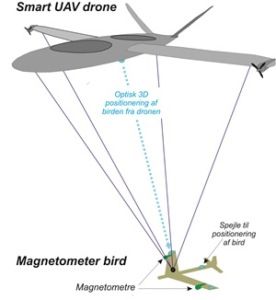A new Danish drone technology can help detect unexploded mines along the Danish coasts, and make it thus safer and cheaper to build offshore wind farms in the future.
The technology is currently being developed by DTU Space in co-operation with the drone manufacturer Sky-Watch, the engineering consultancy Geo and Dong Energy.
According to estimates of the Danish Navy, there are about 40,000 unexploded mines and grenades from the Second World War still lying buried in silt at the bottom of the sea.
Each time energy companies such as Dong Energy want to build a new offshore wind farm, they must first clear tonnes of this old ammunition away, which is both very dangerous, expensive and time consuming.
Just last year, Dong had to dispose of 40 large mines found off the Norfolk coast in the UK, where the company is building the new Race Bank wind farm.
Model of the new drone with ‘magnetometre bird’ (photo: Arne Døssing Andreasen, DTU Space)
READ MORE: Danish drone strategy taking off
Search for mineral deposits or military waste
The newly developed unmanned aerial solution is equipped with a so-called ‘magnetometre bird’, a small plane with 1-2 ultra-sensitive magnetometres that can detect magnetic fluctuations emitted by the old ammunition.
In combination with GPS technology, it will be easier for companies to identify where exactly the unexploded mines are located.
The drone from Sky-Watch is also unique because it flies like a normal plane, but can take off and land vertically.
“We have roughly calculated that if we replaced the traditional ways of working with these drones, we could halve the costs for surveys when we are building an offshore wind farm,” Simon Hviid, a senior geophysicist and team leader at Dong Energy, told Politiken.
“We talk about millions of kroner, which would make [wind] energy cheaper and safer for those who carry out the work.”
The drone will also be tested in Greenland, where it may help in the search for mineral deposits or military waste.
The prototype of the drone will be finished in January and then it will be tested and further developed over the next four years, when it is scheduled to be fully operational.













